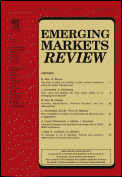
Emerging Markets Review
Scope & Guideline
Empowering Voices in Business and Economics
Introduction
Aims and Scopes
- Financial Market Dynamics:
The journal extensively covers the behavior and interconnectedness of financial markets in emerging economies, exploring phenomena such as risk spillovers, market volatility, and the impact of global economic events. - Corporate Governance and Performance:
A strong focus is placed on corporate governance structures and their implications for firm performance, including studies on ownership structures, board diversity, and the effects of regulatory environments. - Economic Policy Impact Analysis:
The journal investigates the effects of monetary and fiscal policies on emerging market economies, with particular emphasis on how these policies influence capital flows, investment decisions, and economic stability. - Sustainable Finance and Corporate Responsibility:
Emerging Markets Review addresses the growing importance of sustainability in finance, highlighting research on corporate social responsibility, environmental governance, and the role of financial institutions in promoting sustainable practices. - Technological Innovation and Financial Inclusion:
The journal explores the intersection of technology and finance, particularly how innovations like fintech can enhance financial inclusion and reshape traditional banking models in emerging markets.
Trending and Emerging
- Impact of Digital Transformation:
An increasing number of studies are focusing on the effects of digital transformation on financial markets and corporate practices, particularly in the context of fintech and its role in enhancing financial inclusion. - Climate Change and Sustainability:
Research addressing the intersection of climate change, sustainability, and corporate governance is gaining traction, as emerging economies confront environmental challenges while pursuing economic growth. - Behavioral Finance in Emerging Markets:
There is a growing interest in behavioral finance, particularly how cultural factors influence investor behavior and market dynamics in emerging economies. - Geopolitical Risk and Economic Stability:
With rising geopolitical tensions, there is a heightened focus on how geopolitical risk affects economic stability and capital flows in emerging markets. - Network Analysis in Finance:
The use of network analysis to assess risk transmission and the interconnectedness of financial institutions is becoming more prominent, reflecting a trend towards understanding systemic risks in emerging markets.
Declining or Waning
- Traditional Economic Theories:
There has been a noticeable reduction in papers focused on traditional economic theories that do not incorporate the complexities of emerging markets, as researchers increasingly seek to apply more context-specific frameworks. - Generalized Financial Models:
Research that employs overly generalized financial models without adaptation to the unique characteristics of emerging markets has become less prevalent, as scholars recognize the need for more nuanced approaches. - Static Analysis of Market Structures:
The journal has shifted away from static analyses of market structures, favoring dynamic models that account for changing conditions and the influence of global economic factors on emerging markets. - Broad Comparative Studies:
There is a declining trend in studies that broadly compare emerging markets without focusing on specific countries or regions, as the complexity and uniqueness of individual markets become more acknowledged. - Conventional Risk Assessment Techniques:
Research employing conventional risk assessment techniques without considering emerging market specificities has decreased, reflecting a shift towards more innovative methodologies.
Similar Journals

Eurasian Economic Review
Fostering impactful dialogue in economics and finance.Eurasian Economic Review is a premier academic journal dedicated to the dissemination of high-quality research in the field of economics, notably within the Eurasian context. Published by SPRINGER HEIDELBERG in Switzerland, this journal stands out with an impressive Q2 ranking in the 2023 category of Economics, Econometrics and Finance, reflecting its influential role in fostering scholarly dialogue. The journal encompasses a broad array of topics related to economic trends, policy impacts, and theoretical advancements, making it an essential resource for researchers, professionals, and students alike. With a consistent output since its inception in 2011, the Eurasian Economic Review is committed to providing open access to its valuable content, ensuring that important findings are widely available to the global research community. As a member of the top 9th percentile in Scopus rankings for its field, this journal uniquely positions itself as a vital conduit for innovative and impactful research in economics.
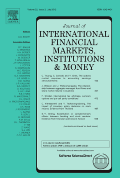
Journal of International Financial Markets Institutions & Money
Innovating Research in International FinanceThe Journal of International Financial Markets, Institutions & Money, published by Elsevier, serves as a leading platform for the dissemination of high-quality research in the fields of finance, economics, and econometrics. With an impressive impact factor reflected in its status as a Q1 journal in both categories for 2023, it ranks among the top journals, positioned at #47 out of 317 in Finance and #111 out of 716 in Economics. This journal offers a unique focus on the interplay between financial markets and institutions on a global scale, making it an essential resource for scholars, practitioners, and students alike. The journal welcomes innovative theoretical, empirical, and applied research, contributing to an exciting dialogue that shapes the future of international finance. For researchers looking to publish their findings, this journal is committed to rigorously engaging with contemporary financial phenomena, positioning itself as a vital cornerstone of academic and professional discourse.
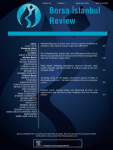
Borsa Istanbul Review
Navigating the complexities of emerging markets.Borsa Istanbul Review, published by ELSEVIER, is a premier open-access journal making significant contributions to the field of Economics and Finance since its inception in 2013. With a commendable Q1 rating in both categories according to the 2023 metrics, this journal ranks impressively at #36 out of 317 in Finance and #91 out of 716 in Economics and Econometrics on Scopus, placing it in the top tier of international academic publications. The journal not only provides a platform for rigorous and innovative research but also aims to foster a deeper understanding of the evolving economic landscape, particularly within the frameworks of emerging markets. Catering to researchers, professionals, and students alike, Borsa Istanbul Review is dedicated to delivering high-quality, peer-reviewed scholarly articles that are freely accessible to enhance global research collaboration. It serves as an essential resource for anyone looking to stay abreast of cutting-edge developments in the financial and economic sectors.
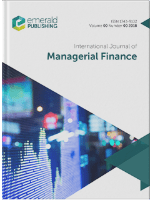
International Journal of Managerial Finance
Bridging theory and practice in managerial finance.The International Journal of Managerial Finance is a leading academic journal published by Emerald Group Publishing Ltd, dedicated to advancing the field of finance through rigorous research and scholarly discourse. Its ISSN is 1743-9132, with an E-ISSN of 1758-6569. Since its inception in 2005, the journal has provided valuable insights and frameworks that bridge theory and practice in managerial finance, making it an essential resource for researchers, professionals, and students alike. With its current standing at Q2 in both Business, Management and Accounting and Finance categories for 2023, and impressive Scopus ranks that place it in the 70th and 68th percentiles respectively, the journal is recognized for its high-quality contributions to the field. Though it does not currently offer open access, the rigorous selection process ensures that published articles are of the highest academic standard, providing a platform for significant discussions around contemporary issues in finance and management. The International Journal of Managerial Finance continues to play a pivotal role in shaping the discourse within the financial sector, fostering knowledge that is instrumental for effective managerial decision-making.

International Journal of Financial Studies
Elevating finance scholarship with every publication.The International Journal of Financial Studies is a premier publication dedicated to advancing the field of finance through open-access research. Published by MDPI based in Switzerland, this journal offers researchers, professionals, and students a platform to disseminate their findings in an accessible format since its establishment in 2013. With its ISSN of 2227-7072 and a commendable impact reflected in its Q2 ranking in finance, it occupies an influential position among finance-related journals, as evidenced by its 65th percentile rank in Scopus. The journal encompasses a wide array of topics in finance, making it essential reading for those seeking to stay abreast of current research trends and methodologies. As an open-access journal, all articles are freely available, significantly enhancing the visibility and reach of published studies, which is crucial for fostering collaboration and innovation within the global financial community. Published continuously until 2024, the International Journal of Financial Studies is not just a source of knowledge; it is a critical contributor to the progression of financial scholarship.

Global Economic Review
Illuminating trends in business and political science.Global Economic Review, published by ROUTLEDGE JOURNALS, TAYLOR & FRANCIS LTD, is a pivotal academic journal that serves the fields of Business, International Management, Economics, Econometrics, and Political Science. With an ISSN of 1226-508X and an E-ISSN of 1744-3873, this esteemed journal has been disseminating vital economic research since 1996, and is set to continue until 2024. The journal holds a notable presence in academic circles, achieving a Q3 quartile ranking in the 2023 category assessments across various disciplines, including Business and International Management, Economics, and Political Science. Notably, it ranks in the top 60th percentile for Political Science and International Relations, showcasing its significant contribution to the discourse within the social sciences. Although not an open-access publication, the Global Economic Review remains accessible to a wide range of researchers, professionals, and students, acting as a critical platform for innovative and impactful economic ideas. Its rigorous peer-review process ensures the publication of high-quality research that responds to the challenges of a rapidly evolving global economy. Scholars seeking to engage with pertinent economic issues will find this journal to be an invaluable resource.
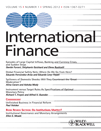
International Finance
Transforming theories into impactful financial practices.International Finance is a prestigious academic journal published by WILEY, dedicated to the exploration and advancement of theories and practices in the realms of finance, development, and geography. With a strong emphasis on empirical and theoretical research, this journal provides a crucial platform for researchers, professionals, and students to disseminate cutting-edge findings that shape our understanding of the financial landscape on a global scale. Holding an impressive impact factor and categorized in the Q2 quartile across multiple disciplines, including Development, Finance, and Geography, the journal has established itself as a significant contributor to scholarly discourse. Since its inception in 1998 and spanning until 2024, International Finance offers a comprehensive overview of current trends and challenges faced in financial contexts, enhancing the decision-making processes within academia and industry alike. Although the journal is not open access, its rigorous peer-review process guarantees high-quality content that is indispensable for anyone engaged in the diverse fields intersecting with finance.
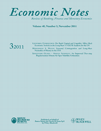
Economic Notes
Advancing Knowledge in Economics and EconometricsEconomic Notes is a peer-reviewed journal published by WILEY, focusing on the dynamic field of economics and econometrics. With an ISSN of 0391-5026 and an E-ISSN of 1468-0300, this esteemed journal offers a platform for researchers, professionals, and students to explore theoretical advancements, empirical studies, and policy implications within the economic landscape. Established in the United Kingdom, Economic Notes has become a noteworthy publication, currently ranked in the Q3 category in the 2023 Economics and Econometrics quartiles, and situating itself at the forefront of the field with a respectable 60th percentile ranking in Scopus. The journal spans a remarkable convergence of scholarship from 2001 to 2024, fueling academic discourse and providing insights into pressing economic issues. Although it does not provide open access options, it remains a crucial resource for those seeking to enhance their understanding and contribute to economic theory and practice.

Asia-Pacific Financial Markets
Unveiling Insights into Regional Financial TrendsAsia-Pacific Financial Markets is a distinguished academic journal published by SPRINGER, dedicated to advancing the field of finance research in the Asia-Pacific region. With an ISSN of 1387-2834 and an E-ISSN of 1573-6946, this journal fosters scholarly discourse on contemporary financial markets, investment strategies, and economic policy implications. Situated within the Q3 category in Finance for 2023, it ranks #140 out of 317 in the Scopus database, reflecting its growing significance and impact within the financial research community, as evidenced by its 55th percentile ranking. Since its inception in 1996, the journal has served as a pivotal platform for researchers, professionals, and students alike, featuring rigorous empirical studies and theoretical frameworks that address emerging financial trends and challenges. While it operates under a subscription model, the journal's comprehensive scope and commitment to high academic standards make it an essential resource for anyone looking to deepen their understanding of finance in the dynamic Asia-Pacific landscape.
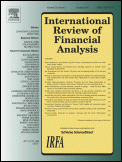
International Review of Financial Analysis
Connecting empirical studies to critical financial challenges.The International Review of Financial Analysis, published by Elsevier Science Inc, is a premier journal dedicated to advancing the fields of finance and economics. With an impressive impact factor and ranked in the top quartile (Q1) of both Economics and Econometrics and Finance categories, this journal is recognized for its high-quality research and significant contributions to the discipline. Since its inception in 1992, it has provided a platform for scholars to present innovative theories and empirical studies that address critical financial issues around the globe, making it a vital resource for researchers, professionals, and students alike. Although it does not offer open access, the journal actively engages with contemporary debates in financial analysis, ultimately empowering its readership to contribute to and benefit from the ongoing discourse. With its convergence of financial research and analytical methodologies through 2024, the International Review of Financial Analysis remains a cornerstone in the pursuit of knowledge within the ever-evolving landscape of finance.